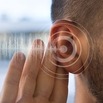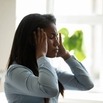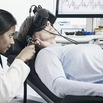IMPORTANT INSTRUCTIONS
- Please review the list of medications below that can interfere with testing.
- Please wear loose fitting clothes (pants please, no dresses) for comfort during testing.
- Refrain from wearing any skin lotions, moisturizing creams, makeup, mascara etc., on your face the day of the testing.
- If you have a beard, please shave your neck. One portion of testing involves placing recording electrodes on your neck muscle.
- You may eat normally before testing but light meals are recommended.
MEDICATIONS
The following is a guideline for taking medications prior to vestibular (balance) testing. It is necessary to avoid certain medications 48 hours prior to testing to produce accurate test results. Please consult with your prescribing provider before discontinuing any medications.
- DON’T TAKE: Sleeping pills, Antihistamines, Cough Medicine, Alcoholic Beverages, Heavy Pain Medication, Muscle Relaxers
- DO TAKE: Heart Medicine, Diabetes Medicine, Thyroid Medicine, Blood Pressure Medicine, Seizure Medicine, Birth Control Pills, Any Antibiotic, Vitamins, Diuretics
- COMMON MEDICATIONS TO AVOID: Antivert/Hismanal, Bonine/Meclizine, Dalmane/Midrin, Diazepam/Pamelor, Dramamine/Phenergan, Elavil/Prozac, Entex/Seldane, Entex LA, Transderm Scop (patch), Feldene/Valium, Fiorinal/Xanax, Diphenidol/Vontrol, Halcion/Triozolam
FREQUENTLY ASKED QUESTIONS
- What does this testing evaluate? Balance testing evaluates parts of the body that help maintain balance, including the brain, central nervous system, visual input, and the inner ear balance (vestibular) function.
- Will the test hurt? Will it make me dizzy? Your balance testing will not be painful. Because we are evaluating the balance system, portions of the testing may cause you to experience sensations of movement. Sensations produced during balance testing is usually not severe and does not usually last an extended period of time.
- Will I be able to drive after I am finished with my testing? We strongly recommend having someone come with you to the testing or be able to pick you up after testing is complete. If this is not feasible, please plan extra time after your appointment to recover before getting behind the wheel.
- Why must I stay off certain medications prior to my testing? Certain medications may affect the results of the testing and should therefore be avoided for at least 48 hours prior to your testing. All forms of alcohol should be avoided for the same period of time. Under certain conditions, the doctor may allow certain medicines up to 24 hours prior to testing, but this may compromise the results.
- Why am I having several different tests run on my balance system? Each test performed provides a piece to the puzzle. There are several different portions to the balance system. Some portions test the inner ear/eye reflexes and others test the inner ear/spinal reflexes. Usually, several tests are necessary to correctly diagnose a problem.
- How long will the testing take? The length of your testing will depend on which examination the doctor is requesting that you have performed. Testing will last between 90-120 minutes.





